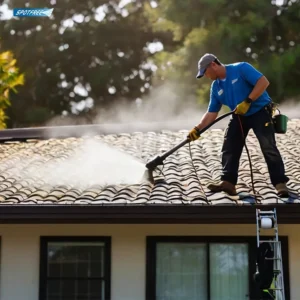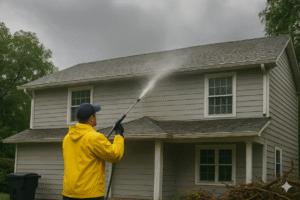Logistics, delivery, and transportation networks rely heavily on fleet vehicles, and maintaining their cleanliness goes beyond appearances. A well-maintained fleet protects brand reputation, prolongs vehicle life, and conveys professionalism. Grand View Research (2024) projects that the global car and truck wash market will grow at a compound annual growth rate (CAGR) of 7.6% from its 2023 valuation of USD 34.8 billion to USD 72.5 billion by 2033.
In high-traffic areas like Florida, where vehicles are exposed to salt air, sand, and humidity that hasten corrosion, the Commercial Fleet Washing Services segment has emerged as crucial for businesses overseeing logistics assets.
A clean fleet has a direct impact on:
- Operational efficiency: According to the US Department of Energy, clean trucks can save up to 5–10% on fuel consumption by reducing drag.
- Maintenance costs: Paint and undercarriage lifespan can be increased by 20% to 25% by avoiding dirt and road salt accumulation.
- Safety and compliance: reflective surfaces, DOT stickers, and visibility markings are all still readable.
- According to a 2023 Transport Marketing Study, clean fleets increase consumer perceptions of trust by 30% to 40%.
Understanding Commercial Fleet Washing Services
Surface cleaning is only one aspect of commercial fleet washing services. Reputable businesses offer integrated systems that adhere to environmental regulations and safeguard your assets.
A good service usually consists of:
- Systems for both soft and high-pressure washing for various car models.
- Biodegradable cleaning solutions that are safe for paint, chrome, and aluminum.
- Systems for recycling and water reclamation that adhere to the Clean Water Act’s Section 402 requirements.
- Fleets can be serviced directly at depots or yards with mobile washing units.
- Reporting and documentation for compliance audits.
Professional cleaning lowers oxidation, aids in the early detection of body damage, and raises each unit’s resale value, which is a benefit that is frequently disregarded in long-term logistics fleet maintenance.
Key Factors to Evaluate When Selecting a Fleet Washing Partner
1. Demonstrated Experience and Industry Standing
Fleet logistics are not always understood by pressure washers. Select a business that has experience with delivery, construction, or trucking fleets. A provider who has worked in Florida for more than five years will be better equipped to handle problems like exposure to saltwater and tropical dirt.
2. Compliance with Wastewater and the Environment
Wash water must meet strict containment and treatment requirements set forth in the Transportation Equipment Cleaning Effluent Regulations (EPA). Find out if your vendor uses biodegradable products, filtration, and closed-loop recovery.
3. Quality of Technology and Equipment
The quality of the wash is determined by the appropriate tools. Seek out:
- High-pressure systems with multiple nozzles for stubborn dirt.
- Oil residue degreasers and foam cannons.
- Wash settings that are temperature-controlled.
- Vinyl wraps and delicate graphics can be cleaned with touchless systems.
When compared to manual washing, automated fleet systems can clean cars 30% faster and use 50% less water, according to the International Carwash Association (ICA).
4. Adaptability & Mobility
Profit loss is equal to fleet downtime. Choose businesses that provide on-site mobile fleet cleaning services, ideally with after-hours scheduling. Your logistics flow won’t be disrupted at all by mobile rigs with onboard water tanks and waste containment.
5. Clear Pricing and Service Agreements
Prominent suppliers offer precise, detailed quotes. Steer clear of flat-rate offers that conceal the price of extras like undercarriage wash or degreasing. Compared to one-time washes, long-term contracts can save 15% to 20% a year.
A clear contract specifies:
- Vehicle size and type classifications
- How often you wash
- Extra services (tire shine, wax, and detailing)
- Service-level assurances
6. Employee Education & Safety
Moving vehicles, pressure systems, and chemical handling are all part of professional washing. Verify that your provider offers PPE to employees and complies with OSHA’s 29 CFR 1910 safety regulations. Teams with proper training avoid mishaps and damage to equipment.
Integrating Washing into Logistics Fleet Maintenance
Fleet washing is a component of overall logistics fleet maintenance and shouldn’t be done separately.
Integration helps your business in the following ways:
- Cleaning aids in the early detection of rust, scratches, and oil leaks.
- Record-keeping: Wash logs are used to track conditions and plan maintenance.
- Cost projection: Over a five-year period, routine cleaning can save up to 25% on repainting and panel replacement expenses.
- ESG alignment: Shows regulators and business clients that you care about the environment.
Your washing program will yield quantifiable returns on investment in terms of uptime and asset lifespan when it aligns with fleet maintenance schedules.
Common Mistakes Businesses Make When Selecting a Provider
These mistakes are made by even well-known logistics companies:
- Cheap services that put money before quality may use harsh chemicals that dull paint or forego wastewater treatment.
- Disregarding local laws; a discharge that does not comply may result in environmental penalties.
- Ignoring insurance: Uninsured vendors expose you to liability risk.
- Lack of an inspection policy: quality varies greatly in the absence of post-wash checks.
- Delivery cycles are disrupted by inflexible providers and poor scheduling coordination.
By avoiding these mistakes, you can be sure that the partner you choose will support your fleet’s objectives rather than increase risk.
Why Florida Fleets Need Specialized Cleaning
Compared to inland states, corrosion is accelerated more quickly in Florida due to the state’s high humidity, salt air, and road dust. When compared to dry climates, salt-laden environments can accelerate metal corrosion by up to 300 percent, according to the National Association of Corrosion Engineers (NACE).
Working with a Florida-based fleet cleaning company that understands these difficulties is crucial for coastal logistics operations; it is not an option. They know how to prevent oxidation of undercarriage components and deal with salt accumulation.
Squeaky Clean Services – Florida’s Trusted Fleet Washing Partner
Squeaky Clean Services, which has its headquarters in Florida, is the industry leader in the area of expert commercial fleet washing services. Their knowledge of delivery fleets, logistics, and trucking includes:
- In Florida, mobile washing units are available for on-site service.
- Wastewater recovery systems that comply with EPA regulations.
- Environmentally friendly detergents that are safe for decals and paint.
- Contracts that are flexible enough to fit your logistics schedule.
- Comprehensive fleet records and accountability reports.
Every vehicle is handled precisely thanks to the training their technicians receive in both safety compliance and washing technology. The strategy used by Squeaky Clean fits in perfectly with your logistics fleet maintenance process, safeguarding your assets, guaranteeing DOT visibility, and upholding your brand image throughout every mile.







